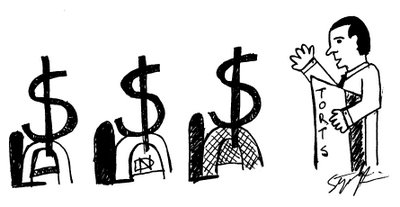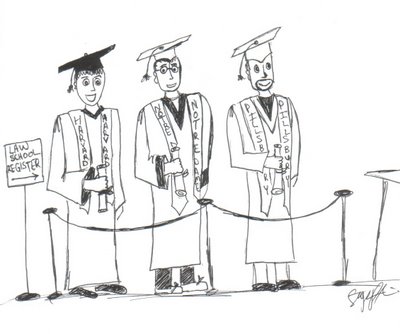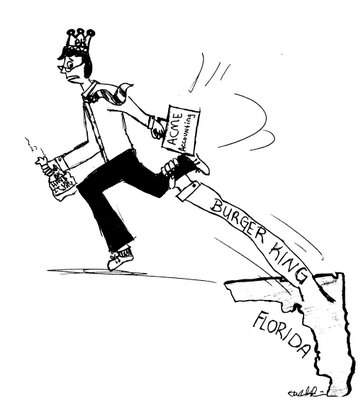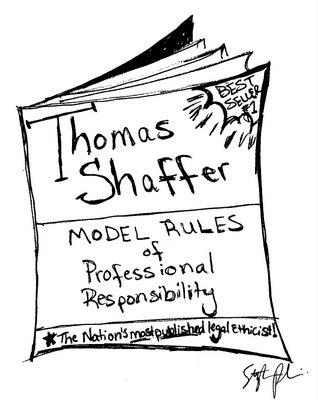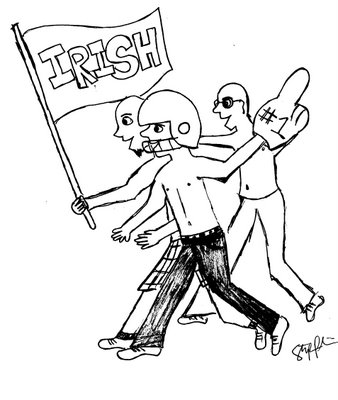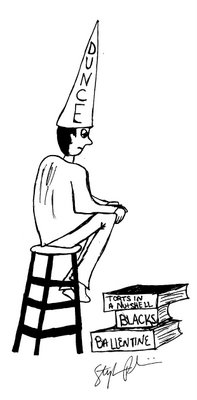
Graduate student
Pieder Beeli introduces the speaker to a near capacity crowd at
Notre Dame's
DeBartolo Auditorium.
"After graduating from
Harvard, Professor
Phillip E. Johnson attended law school at the
University of Chicago where he finished first in his class," Beeli says. "He served as clerk to the chief justice of the Supreme Court,
Earl Warren, before joining the law faculty at
UC Berkeley. There he holds a distinguished faculty chair. Dr. Johnson is the nation’s leading critic of
naturalism and
Darwinism. Let’s give him a warm round of applause."
Harvard. Chicago. Berkeley. A coast-to-coast pedigree of top-ranked schools. And a
Supreme Court clerkship - the ultimate smart club for recent law grads.
Johnson begins by saying that thirty years ago he tried to visit
Notre Dame stadium. "The traffic was so horrible that I vowed never to come again!" We laugh. He then praises the
Catholic intellectual tradition for its respect of learning in all fields.
The presentation is in two parts, first lecture and then question-answer. Small of stature with tiny hands and elfin features, Johnson speaks quite fast.
His first point is that Darwinian evolution contradicts any meaningful
theism in which God plays a role as a creator. "Evolution as it is known to contemporary science is an unplanned, unguided, undirected process. Human life is an accident. We were created by a purposeless, mechanical process that cares nothing for us."
Johnson quotes from a variety of sources, including Harvard professor
Stephen J. Gould, whom he calls the most prominent American exponent of the theory. "Before Darwin we thought that a benevolent God had created us. After the acceptance of Darwinism, however, that belief became intellectually untenable."
Johnson’s second point deals with the complexity of plants and animals. "The human body is a complicated arrangement of interrelated parts that makes a spaceship or computer look rather low-tech." He quotes from
The Blind Watchmaker, a book by
University of Oxford professor
Richard Dawkins whom Johnson describes as a fanatical atheist: "Biology is the study of complicated things that give the appearance of having been designed for a purpose."
Pacing back and forth, Johnson asks, "But if there is no design, what do we rely on instead?" Again he quotes from Dawkins. "
Natural selection is the blind watchmaker, blind because it does not see ahead, does not plan consequences, has no purpose or view, yet the living results of natural selection overwhelmingly impress us with the appearance of design as if by a master watchmaker."
Johnson, however, argues that
natural selection alone is insufficient to explain the design found in nature. He reads Dawkins explanation of how the bat got its wings. In short, small folds of skin gave some tree-top rodents an advantage over others. A "just-so" story is how Johnson terms it. "No!" he says. "Genetic information is the product of intelligence, and you need intelligence to make it. You’re never going to solve the problem through these unintelligent, material causes."
When it comes time for Q&A, the students are quick to line up. Some of the questions are friendly, others hostile. Johnson’s demeanor has changed. He too is more combative. When the questioner speaks, Johnson looks away in concentration.
Then up to the microphone strolls an older man with thick jowls and a wide girth, the physical opposite of Johnson. "Your book
Darwin on Trial challenges
theistic Darwinism, a position you ridicule..."
Johnson interrupts him. "I don’t use ridicule, but I claim it’s logically incoherent." The crowd laughs. "That is, it’s either not evolution, or it’s not theistic."
"I don’t know what happens to you in court if you’re characterized as logically incoherent," the man says, "but if my dissertation defense had been so characterized, I would have failed. That’s constitutes ridicule to me."
"So I have to say that the position is logically coherent in order to be polite."
"I don’t want you to be polite," says the man, and draws his first laughs as well. "This evening you’ve displayed a capacity to utilize any perspective on any issue that would advance your case, just as a good attorney would. But if you don’t mind, I’d like to cross-examine you for a moment. I’ll ask you my hardest question first, because that’s the best mark of respect I can muster in academic life."
Johnson nods.
"Your chapter on
molecular evolution, which I found somewhat disappointing, is almost totally devoted to the
neutralist hypothesis that there’s a biological clock which enables us to tell how much
cytochrome C in various organisms has diverged from the putative ancestry on the basis of
amino-acid replacements at a variety of locations," the man says, his voice low and deep. "So my first questions is about
enzyme action. Is cytochrome C an enzyme or a receptor or what is it?"
The high-pitched laughter of one student breaks the silence.
"What is your point?" Johnson asks in a sharp tone.
"I want to know whether or not you have simply culled the evidence looking for arguments against Darwin as a prosecutor would."
"I’ll tell you how I’ve approached the molecular evidence. It’s with the question of ‘what does this do to substantiate or cast doubt on the blind watchmaker mechanism?’ This question carries all the philosophical weight, and that’s what I’m interested in. Now what you’re attempting is ridicule."
"No," says the man.
"What you’re attempting is ‘let’s get this guy to take a test in biochemisty," Johnson says. "We can then ridicule him in front of an audience and we won’t have to deal with the issues.’"
The man waits for the applause to die down. "To the contrary. I assume you have as many friends here as I do."
"By the way, are you a biochemist?" Johnson asks.
"Do you mind, sir. For a moment I’ll ask the questions. Do you know enough about cytochrome C to deal with the question of whether or not a 60 to 70 percentage variation of the amino acid substitutions would be evidence for or against the blind watchmaker hypothesis."
"It isn’t the kind of thing that would tend to be evidence about it any way," Johnson says. "I have a close colleague, a professor in biochemistry at
Lehigh University in Pennsylvania, who by the way doesn’t mind using his name. It’s
Michael Behe." Johnson summarizes Behe’s argument that biochemical structures in cells are
irreducibly complex and could not have been built by the stepwise, Darwinian mechanism. "That’s what’s important about the evidence. If you want ask whether or not I can pass a biochemistry exam here tonight, the answer is ‘no.’ Is that a frank enough answer?"
"That’s very frank. And if you’d like, my name is
Edward Manier. I teach history and philosophy of science with a speciality in biology, evolution, and neuroscience. And it may very well be that your biochemistry friend doesn’t know my name either."
I chuckle, though I wonder if it’s Manier whose ignorance is showing.
"Here’s one last question to see how much biology you know, apart from your assiduous effort to look for all the negative evidence about Darwinism."
Johnson cuts him off. "I never resort to that kind of thing."
Manier laughs and hooks his thumbs under both lapels. "That’s right. You just happen to be from Harvard and Chicago, but there’s no one in here but us country lawyers, is there?"
I’m stunned by the rudeness and mockery.
Manier continues. "What I’d really like to know is whether you think it’s misguided in the study of the human genome to use the mouse genome as a model. If you do think that’s misguided, I’d like you to tell us all....
"I think that’s an attempt to muddy the waters," Johnson says, irritated, and I’m not going to pay any more attention to it."
A cadre of students laugh in derision.
"Oh, I understand," says Manier. "You’ll be the judge
and the jury." He turns and walks out of the auditorium to faint applause.
* * *
 The last class on Friday is Criminal Procedure. It’s been a grueling week: 24 cases to read and brief. I’m tired, but looking forward to Saturday. A former colleague of mine from Pillsbury has arrived in South Bend. Tomorrow we’ll visit Notre Dame stadium to watch the Irish play the University of Texas Longhorns.
The last class on Friday is Criminal Procedure. It’s been a grueling week: 24 cases to read and brief. I’m tired, but looking forward to Saturday. A former colleague of mine from Pillsbury has arrived in South Bend. Tomorrow we’ll visit Notre Dame stadium to watch the Irish play the University of Texas Longhorns.
